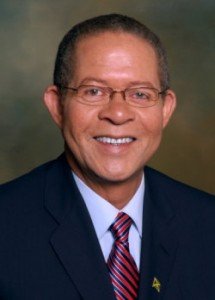Jamaica’s Prime Minister Bruce Golding is taking a 15 per cent pay cut and has asked other parliamentarian to follow suit. He announced that decision as he outlined a number of measures that will go into effect, including a freeze on the wages of civil servants.
In an address to the nation yesterday ahead of the budget presentation tomorrow, he put Jamaicans on warning that they would be some belt-tightening measures. But he said he believes that “those of us who lead will have to lead by example”.
“Last year, I announced that parliamentary salaries would be tied to those of public sector workers. In other words, parliamentarians can no longer give themselves salary increases and higher than that granted to public sector workers. This year, not only am I foregoing the seven per cent increase that would have been due on April 1st, but I will be taking a 15 per cent cut in my salary and I ask all Members of Parliament to join in this symbolically important example by taking a 10 per cent cut in theirs,” he said.
Golding said plans to increase public sector salaries have also had to be put on hold.
A memorandum of understanding between the government and the Confederation of Trade Unions called for an increase in public sector wages of 15 per cent effective April 1st, 2008 and while that has been paid, the agreement also provides for a further increase of seven per cent as of April 1st, 2009.
Additionally, in 2006, the government signed an agreement to align teachers’ salaries to 80 per cent of private sector salaries with effect from July 2007. This retroactive payment which became due on April 1st, this year amounts to some J$18 billion (US$204.5 million). Those increases would move up the public sector wage bill by 46 per cent compared to two years ago.
Golding added that making these payments would push the fiscal deficit to unacceptable levels.
“It would require a level of expenditure that cannot be sustained, not in these harsh times,” he said, noting that apart from interest payments on public debt, the government’s payroll is the biggest item of expenditure in the budget – over J$100 billion (US$1.1 billion).
“We have, therefore, had to freeze wages at the levels which obtained on March 31st and we have had to ask public sector workers to forego the increases due this year.
“The other option would be to lay off thousands of workers at a time when alternative employment is hard to find. There are some categories of workers such as nurses that did not benefit from the increases granted last year and we will have to find some accommodation for them but the rest of us will have to hold strain,” Prime Minister Golding added.
The Jamaica leader said he has also all Permanent Secretaries and heads of government agencies to set about reducing expenditure “to save every dollar that can be saved”.
“It costs us over J$70 billion (US$795 million) per year to finance government activities not including wages. We have to cut that back. We have to use less electricity, make fewer phone calls and use less stationery, do less driving up and down. We have to take better care of government vehicles and equipment so that we don’t have to spend so much to repair them or to replace them so often,” Golding said.
“I have instructed these public sector leaders to reduce expenditure everywhere they can without reducing the service they must deliver.”
The Prime Minister said all these measures are necessary because “the income side of the budget has been hurt by the global economic crisis”.
Jamaica’s economy has been hurt recently by the closure of bauxite companies, cut backs by some private sector companies and a slow down in remittances.
But he made it clear that there were services that would not be affected by cuts, including crime fighting, education, healthcare and assistance for pensioners and the very poor.
“These are vital services on which, even in these hard times, we need to spend more, not less. So, deeper cuts have to be made in other areas. We have no choice,” Prime Minister Golding said.
He also spoke of the need to reform the tax system to make it more equitable and allow it to stimulate rather than stifle investment, production and job creation.




